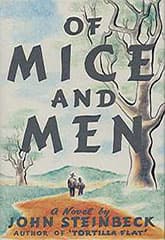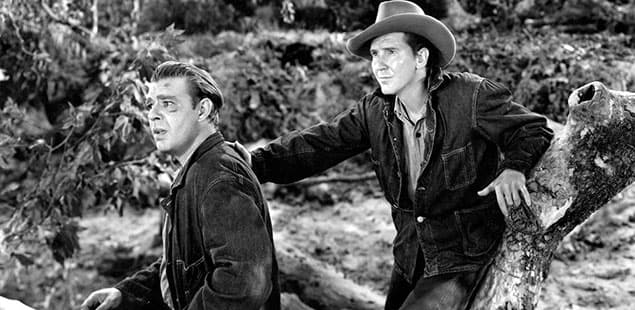Of Mice and Men
Critique • Quotes • At the movies
 First edition
First editionFirst publication
1937
Literature form
Novella
Genre
Literary
Writing language
English
Author's country
United States
Length
Approx. 34,500 words

George (Burgess Meredith, right) takes care of Lennie (Lon Chaney Jr.) in 1939 adaptation.
The importance of earnest moviemaking
Of Mice and Men (1939): Film, 107 minutes; director Lewis Milestone; writer Eugene Solow; featuring Burgess Meredith, Lon Chaney Jr., Betty Field, Charles Bickford
It's said that mediocre books make great movies and great books make mediocre movies. John Steinbeck's works make mincemeat of this commonplace, as his best literature has almost uniformly been adapted for very good—and often great—films.
Perhaps it's the inherent human drama in his writing that translates to the screen so well. Of Mice and Men, for instance, is close to being a theatrical play with its efficient stage direction and compact structure. The focus is on revelations and development of characters. All delivered colloquially with an underlying earnestness, that begs for careful treatment.
The two best-known films of the book stick pretty closely to Steinbeck's outline and brilliant dialogue, opening the action up only slightly to make the telling of the story more visual.
George and Lennie brought to life
The 1939 black-and-white Of Mice and Men set the standard for earnest and touching portrayals of tough but soft-hearted George Milton and strong but slow-witted Lennie Small. Both Burgess Meredith and Lon Chaney Jr. come into their own as great film actors in the respective roles.
In retrospect, however, they may have been too effective. George is a bit too cheery and Lennie a bit too "gee whillikers" endearingly slow, given the hard lives the itinerant workers are supposed to have lived and the provocations of the nasty folks they run into. Perhaps we can chalk this up to the more obvious and melodramatic acting that audiences of that era expected.
The film opens not with the river setting where George and Lennie recount their recent escapades, as in the novella, but a little earlier with the pair running from a posse. They escape by hiding under weeds in a ditch, then taking the bus and hiking to their next job, which leads them to the river of the story.
From there on in however, starting with that wonderful interplay of the two of them as they bed down by the water, the scenes unfold pretty much the same as Steinbeck related.
Classic scenes from the book include broken-down old ranch-hand Candy (Roman Bohnen) finally agreeing to let his broken-down old dog be taken out and put down, while he and the other men nervously await the shot. And there's Candy, Lennie and George dreaming about the small farm they're going to buy and settle down on as rulers of their own lives for a change. Lennie being bullied by pugnacious boss's son Curley (B-movie western star Bob Steele), until he responds and goes too far, not recognizing his own strength. Lennie trying to hide the dead puppy. Curley's wife (Betty Field) sexually teasing all the men but coming onto Lennie as a friend.... And that inevitable ending.
A few minor changes: Lennie carries a dead bird instead of a dead mouse at the beginning. The temptress at the ranch is somewhat raunchier than in the book. The blackness of the "stable buck" is played down somewhat.
But you get wrapped up in the story so completely, with such fine and sensitive portrayals of all the major and secondary characters, that after a while you can't remember what was different in the book. And at the end when George ultimately takes care of Lennie as he must—in a scene written and played to perfection—one cannot imagine another conclusion that could at once be so fitting and so disturbing.
For despite the motion picture strictures of the time, all involved find a way to make a relatively realistic, yet profoundly affecting, account of brotherly love.
— Eric
Critique • Quotes • At the movies
1939, 1992

